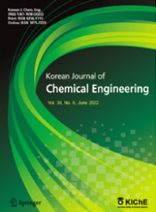Overall
- Language
- English
- Conflict of Interest
- In relation to this article, we declare that there is no conflict of interest.
- Publication history
-
Received May 9, 2023
Accepted January 24, 2024
-
 This is an Open-Access article distributed under the terms of the Creative Commons Attribution Non-Commercial License (http://creativecommons.org/licenses/bync/3.0) which permits
unrestricted non-commercial use, distribution, and reproduction in any medium, provided the original work is properly cited.
This is an Open-Access article distributed under the terms of the Creative Commons Attribution Non-Commercial License (http://creativecommons.org/licenses/bync/3.0) which permits
unrestricted non-commercial use, distribution, and reproduction in any medium, provided the original work is properly cited.
Most Cited
Modifi ed Dual EKF with Machine Learning Model for Fouling Prediction of Industrial Heat Exchanger
Abstract
Accurate and online prediction of heat exchanger (HE) fouling is one of the primary requirements for precise control, predictive
maintenance, and operational continuity. As fouling tends to alter the HE dynamics, a dual extended Kalman fi lter
(DEKF) becomes the ideal technique to predict fouling along with the HE states concurrently. A modifi cation in DEKF
is proposed in this work to estimate the states of HE and fouling resistance (FR) using a linear parametric varying (LPV)
model. FR prediction model of DEKF is restructured to include a machine learning (ML) model to provide guiding input.
The guiding input provides a preliminary estimate of FR, which needs to be fi ne-tuned by the DEKF. This reduces the
overhead on DEKF and enables faster convergence. GA is used to tune the weightage given to the guiding input from the
ML model, which can improve the overall estimation accuracy. The performance of the proposed DEKF is comparatively
evaluated under fi ve diff erent fouling conditions encountered by an industrial HE. Experimental results demonstrate about
38.49% improvement in estimation accuracy for FR on average.

